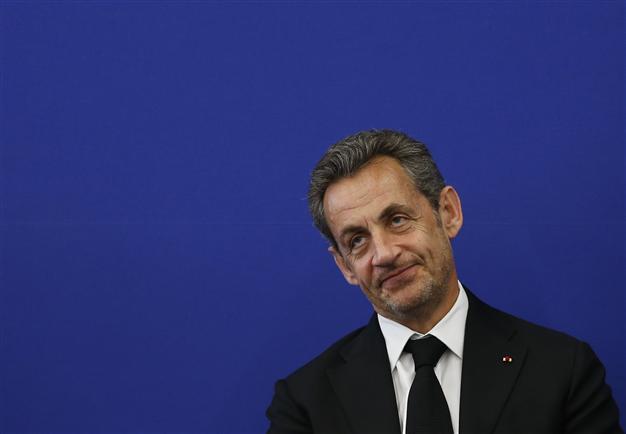France's Hollande, Sarkozy spar over 'Stasi' wiretapping
PARIS - Agence France-Presse

Sarkozy's words drew sharp reactions from others in Hollande's administration. AFP Photo
French ex-president Nicolas Sarkozy lashed out Thursday over the court-ordered wiretapping of his phones, with a comparison to snooping by East Germany's Stasi police that drew outrage from current leader Francois Hollande.Sarkozy, 59, referred to the feared communist-era secret police in a stinging piece for the newspaper Le Figaro, in which he broke a long silence on mounting corruption claims against him that are undermining his chance of a comeback.
"This is not an extract of the marvellous film 'The Lives of Others' on East Germany and the activities of the Stasi. It's not the actions of a dictator against his opponents. This is France," he wrote.
That earned a stern rebuke from Hollande, the Socialist who in 2012 elections defeated Sarkozy and took over France's presidency.
"To raise the idea that our country, our republic, might not be founded on liberty is to introduce a doubt that is baseless," he said.
"Any comparison with dictatorships is obviously intolerable."
Hollande -- while saying he "will not respond" to any row -- added that he had a duty as head of state to uphold the independence of the courts and due process under the law.
Sarkozy, a conservative who served just one term from 2007 to 2012 before losing to Hollande, is widely seen as positioning himself for a return bid for the presidency in 2017. Hollande's record-low popularity -- less than two years after taking office -- had appeared to give him a boost.
But Sarkozy's image has become marred by an increasingly tangled web of scandals, culminating with allegations in the press this month that he attempted to pervert the course of justice -- information reportedly gleaned from excerpts of tapped phone conversations with his lawyer.
The publication this week of more detailed extracts of the conversation was seen by many as a nail in the coffin of his comeback ambition.
With characteristic combativeness, though, Sarkozy came out swinging in his tract in Le Figaro, a conservative daily.
"I think it is now my duty to break this silence. If I do this, it is because the sacred principles of our republic are trampled on with unheard of violence and with an unprecedented absence of qualms," Sarkozy wrote.
He slammed the leaks as politically motivated, rejected several corruption cases against him and denied any desire to return to politics.
"Who handed over these documents when no lawyer has access to the procedure? The only people who hold (the documents) are judges or policemen... Are they above laws and judicial secrecy?" he asked of the phone tap leaks to newspaper Le Monde and the Mediapart website.
He also threw doubt on claims by the justice and interior ministers that they did not know about the phone taps. "Who are we kidding?"
His words drew sharp reactions from others in Hollande's administration.
Justice Minister Christiane Taubira said she had "no intention of accepting the insults" regarding the propriety of judges.
Prime Minister Jean-Marc Ayrault also denounced Sarkozy's attack on judges and police as a "serious moral mistake".
Judges started tapping Sarkozy's phones last year after opening a formal investigation into allegations he accepted up to 50 million euros ($70 million) in cash from late Libyan dictator Moamer Kadhafi for his 2007 election campaign.
They unwittingly stumbled upon the conversations later leaked to the media, which allegedly suggested Sarkozy got a friendly judge to try to influence the outcome of legal deliberations in one of France's highest courts in a completely separate case.
These proceedings at the Cour de Cassation centred on the seizure of Sarkozy's diaries by judges probing the alleged illegal financing of his UMP party by France's richest woman, L'Oreal heiress Liliane Bettencourt.
Judges suspect Bettencourt, 91, was taken advantage of when she was too frail to know what she was doing. Although formal charges against Sarkozy were dropped in October, 10 other people have been sent for trial.
















